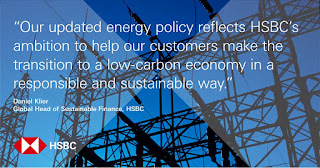HSBC pledges to stop funding coal power stations
Pressure from a new brand of investors
has caused a change in lending rules. Environmental impact is now an
increasingly important factor that investors will consider.
On Friday, HSBC announced its promise
to end its financing of coal power stations in a number of different countries
as well as oil sands and Arctic offshore drilling projects. This comes in the
wake of criticism by pressure groups regarding its lending rules.
As the biggest bank in Europe, this
move will undoubtedly cause ripples in the banking sector and could start a
trend for other banks to follow. The promise highlights the pressure that
investors are putting on lenders to take responsibility for their actions with
regards to climate change. It also shows how the energy industry is likely to
encounter obstacles more frequently as the global effort to tackle climate
change is ramped up.
Climate change campaigners have
welcomed HSBC’s new lending rules and its clear change in its environmental
stance. The move comes in the wake of other such moves by various other large
banks including ING, BNP Paribas and BBVA.
The promise given by HSBC was that it
will stop financing new coal-fired power stations around the world. The only
countries that will still receive financing are Indonesia, Bangladesh and
Vietnam. These countries will continue to be financed for the next five years
if there is no other option available to them.
The head of strategy and sustainable
finance at HSBC, Daniel Klier, noted that in countries like Bangladesh, where
over 60 million people still do not have electricity, coal power is the only
viable way to increase the power supply.
In fact, of the seven coal power
projects HSBC financed in recent years, three of these were in the
aforementioned countries. The decision to finance these particular stations is
not a commercial one. It is, instead, a balancing act whereby two sustainable
development goals are clashing – one being getting power to the people and the
other being to tackle climate change.
Originally, HSBC agreed to end its
financing of coal projects in the developed world. However, this has now been
expanded to include every country but those specified and it aims to do this by
the end of next year.
To get an idea of what a change this
will be, over the last three years, the bank has provided over $2.1 billion in
financing to new coal power projects. This places it at number 14 in terms of
world banks.
Katie Kedward is part of ShareAction, a
campaign group. She stated that last year HSBC actually increased its lending
to the coal power sector. Her group was planning a campaign against this but
the bank’s new policy has diffused any potential future protests on the matter.
Indeed, this move puts HSBC at the forefront of the UK banking world’s fight
against climate change. She hopes that other banks will
follow in its footsteps.
HSBC is also going to end its financing
for companies that are likely to use more than half of the money for mining or
pipeline projects.
The important thing, in the eyes of
Mr.Klier, is that companies and banks work closely to transition to a
low-carbon economy.




Comments
Post a Comment